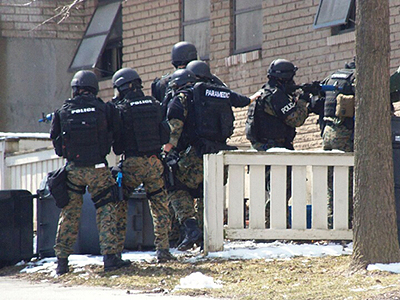
 The echo of bomb blasts adorned a tightly-knit neighborhood followed by the crackling sound emanating from a barrage of bullets that filled the air. Officers storm a vacant multi-housing building military-style in sharp pursuit of a suspect. Not far away, a little girl runs for safety in her own home, sheltering herself from the perceived violence that has swiftly entered her world.
The echo of bomb blasts adorned a tightly-knit neighborhood followed by the crackling sound emanating from a barrage of bullets that filled the air. Officers storm a vacant multi-housing building military-style in sharp pursuit of a suspect. Not far away, a little girl runs for safety in her own home, sheltering herself from the perceived violence that has swiftly entered her world.
The war outside seems unreal. In fact, it isn’t real at all.
This isn’t war-torn Bosnia circa 1992 or today’s clashing Syrian forces spilling into the streets. However, the faces of the people in fear are minorities and the effect is surreal for one neighborhood in Albany, NY that is still trying to understand the reason for a police training exercise conducted in March in an Arbor Hill neighborhood that is home to several housing projects.
To say Lauren Manning was upset and disconcerted to discover her neighborhood was turned upside down would be an understatement. Manning first received word that something unsettling was happening within her neighborhood from her 4-year-old daughter’s babysitter who called her at work, explaining what little she knew at the time.
According to Manning, officers from the Albany Police Department locked down her neighborhood until the training exercise concluded, not allowing anyone to leave.
“As I’m speaking with (the babysitter) I hear the sounds of bombs, breaking glass, automatic weapons and my daughter crying to the babysitter ‘let’s go’. I then ask the babysitter why is a cop standing in front of the door. She replied ‘so I don’t go out’ and so our neighbor can’t come in. At this point, the officer told my neighbor to go home, nobody in or out and if he didn’t leave he was going to be arrested,” said Manning.
By the time she arrived home, left behind were bullet shell casings, debris and simulated blood. For weeks it would serve as a reminder of the virtual violence that transpired and the fear her daughter and neighbors had to endure. Manning felt it was also a symbol of an inequality her neighborhood had to face and the inhumane attitude officers have toward people in her neighborhood — an area that is home to predominately minorities.
Read complete article here


